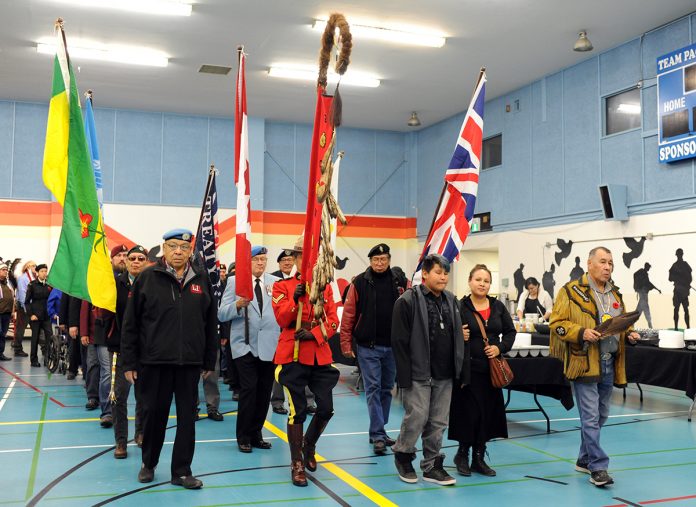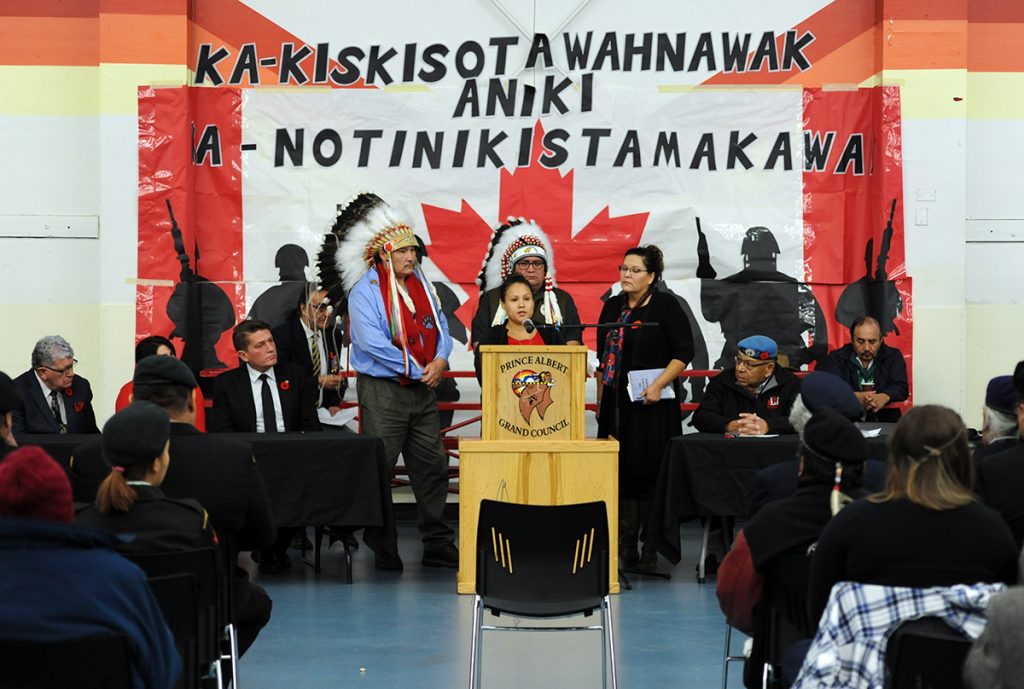
As the Prince Albert Grand Council gathered Friday morning to honour Indigenous veterans for Remembrance Day, Veronica Morin spoke in remembrance of her late husband, Darby Morin, who died in 2009 in Afghanistan.
“A lot of people don’t realize that there are people behind the scenes when our service members go overseas. When our military people are serving, they have people holding down the fort for them, and that’s us,” the mother of two said.
She was part of a group of dignitaries who spoke during the ceremony to pay homage to Indigenous veterans from the Prince Albert area who’ve served in the First and Second World Wars, along with the Korean War, the Vietnam War, peacekeeping missions in Bosnia and the war in Afghanistan.
The ceremony was held at the Senator Allen Bird gym.
Darby Morin grew up on the Big River First Nation. As soon as he graduated high school in 2003, he joined the United States Army, according to his obituary.

After he and Veronica were stationed at Fort Eustis, Va. for four years, Darby was transferred to Fort Drum, N.Y. in 2008.
In December 2008, he deployed to Logar province in southwest Afghanistan and near Pakistan’s north central border. He deployed as a chemical weapons specialist.
On Aug. 22, 2009, Darby was on night patrol in a military vehicle on a mountain road along the Afghan-Pakistan border, according to his obituary. The driver lost control of the vehicle and it rolled, killing Darby.
Veronica, a Cree woman from the Big River First Nation, described how she struggled to find support from the Canadian military after her husband’s death.
“When I first moved home, I found out there weren’t many resources for us, because my husband was in the U.S. military.”
She also needed to provide for her and Darby’s two sons, Christian and Bluesky.
“The main (example) that really bothered me the most is we didn’t have specific counselling for military loss for family members. I called the Dundurn, Sask., office and asked if they have any resources for military families who are suffering from the loss of their vet, and they didn’t have anything for me. They said that’s because my husband was a U.S. military vet.
“I tried to explain to them that as an Indigenous person, we can serve on either side, so we do count as Canadian military, too.”
Morin gave up on looking for support from the Canadian military.
Instead, she found help through a donation-run support program in the U.S. called the Tragedy Assistance Program for Survivors (TAPS).
She said she didn’t have a choice; the phone number for TAPS was the only one she had to find counselling support.

The program allowed her to search out the right counsellor for her needs in Saskatoon.
“A lot of them, they weren’t specified for my specific loss. I tried a bunch of different counsellors and that’s when I found out that I don’t have to take the counsellor that they assign for you.
“You do have a choice to ask for a different counsellor.”
She said that she and her sons now regularly meet with a counsellor who helps them deal with Darby’s death.
Moving forward, Veronica said she wants to see more support in Canada for loved ones who survive their deceased military spouses and family members, whether Indigenous or non-Indigenous.
She also hopes that people pay more respect to veterans and their family members at home.
“I know I heard a saying that goes something like ‘the military wives are also known as a silent rank,’ because we help send away our husbands, and we’re the ones helping our families at home so they can focus on their jobs.
“And when they leave, that’s the head of our household leaving, and we’re left to try to figure out how to survive on our own without them. It’s really tough, and I think a lot of people don’t think about that.”

